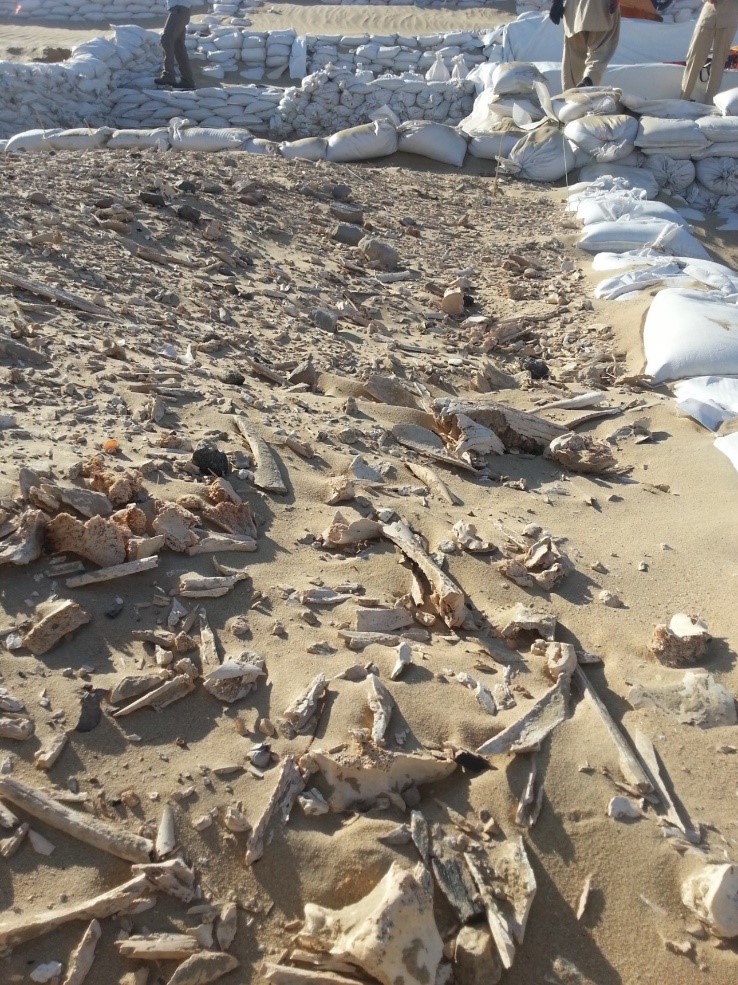1200 Years of Human-Animal Interactions at the Desert Fringes of Late Prehistoric Southeastern Arabia: The Zooarchaeology of Saruq al-Hadid
Abstract

 The study of animal bones recovered from archaeological sites can provide a unique insight into the activity of ancient humans. This can include, but is by no means limited to, insights into areas such as diet, resource use, transhumance, religious or cultural beliefs, and socially formative activities such as hunting. A prodigious assemblage of animal bone was recovered from the late-prehistoric site of Saruq al-Hadid (c.2000 BCE – c.800 BCE), located on the fringes of the Rub al-Khali desert in southeastern Arabia. Little is known about how this interior desert region was utilised by prehistoric societies in southeastern Arabia, with the majority of research in this region focusing on the coastal or mountainous zones. The study of this faunal assemblage, undertaken as part of the Saruq al-Hadid Archaeological Research Project (SHARP), has therefore provided large amounts of new information regarding the occupation of the desert fringes of southeastern Arabia during the Bronze and Iron Ages. Notably this includes evidence for the large-scale exploitation of wild animals, the transport of marine and coastal resources to the interior and tentative insights into the nature of dromedary camel (Camelus dromedarius) domestication. This presentation will outline the composition of the faunal remains recovered from Saruq al-Hadid, before discussing the insights gained by their analysis. The significance of these insights shall then be demonstrated, in terms of understanding the occupation of Saruq al-Hadid, the occupation of southeastern Arabia and human adaptations to marginal environments.
The study of animal bones recovered from archaeological sites can provide a unique insight into the activity of ancient humans. This can include, but is by no means limited to, insights into areas such as diet, resource use, transhumance, religious or cultural beliefs, and socially formative activities such as hunting. A prodigious assemblage of animal bone was recovered from the late-prehistoric site of Saruq al-Hadid (c.2000 BCE – c.800 BCE), located on the fringes of the Rub al-Khali desert in southeastern Arabia. Little is known about how this interior desert region was utilised by prehistoric societies in southeastern Arabia, with the majority of research in this region focusing on the coastal or mountainous zones. The study of this faunal assemblage, undertaken as part of the Saruq al-Hadid Archaeological Research Project (SHARP), has therefore provided large amounts of new information regarding the occupation of the desert fringes of southeastern Arabia during the Bronze and Iron Ages. Notably this includes evidence for the large-scale exploitation of wild animals, the transport of marine and coastal resources to the interior and tentative insights into the nature of dromedary camel (Camelus dromedarius) domestication. This presentation will outline the composition of the faunal remains recovered from Saruq al-Hadid, before discussing the insights gained by their analysis. The significance of these insights shall then be demonstrated, in terms of understanding the occupation of Saruq al-Hadid, the occupation of southeastern Arabia and human adaptations to marginal environments.
About the presenter
James Roberts recently (on the 2nd May!) graduated from his PhD program at the University of New England (UNE), that focused on human-animal interactions in late prehistoric southeastern Arabia. Originally from the United Kingdom, James studied zooarchaeology at the University of Nottingham to Masters level before moving to the UNE to work for Professor Lloyd Weeks as the zooarchaeologist for the SHARP team. Post-graduation, James intends to continue his research into prehistoric Arabia while providing zooarchaeological services for commercial archaeology firms in Australia.
About Archaeology Working Papers
The Working Papers in Archaeology seminar series provides a forum for dissemination of archaeological research and ideas amongst UQ archaeology students and staff. All students are invited to attend the series and postgraduate students, from honours upwards, are invited to present their research. The aim is to provide opportunities for students, staff and those from outside UQ, to present and discuss their work in an informal environment. It is hoped that anyone interested in current archaeological directions, both within and outside the School and University, will be able to attend and contribute to the series.


